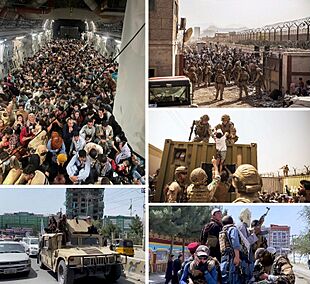Fall of Kabul (2021) facts for kids
Quick facts for kids Fall of Kabul |
|||||||||
|---|---|---|---|---|---|---|---|---|---|
| Part of the 2021 Taliban offensive of the War in Afghanistan (2001–2021) and the war on terror | |||||||||
 Clockwise from top left: Afghans fleeing Kabul Airport aboard a US Boeing C-17 Globemaster III, US Marines assisting at an evacuation checkpoint at Hamid Karzai International Airport, coalition soldiers assist a child during the evacuation, armed Taliban fighters in Kabul, Taliban fighters aboard a captured Humvee |
|||||||||
|
|||||||||
| Belligerents | |||||||||
Supported by: |
|||||||||
| Commanders and leaders | |||||||||
|
|
||||||||
| Units involved | |||||||||
| Taliban units |
|
||||||||
On 15 August 2021, Afghanistan's capital city of Kabul was captured by the Taliban after a major insurgent offensive that began in May 2021. It was the final action of the War in Afghanistan, and marked a total victory for the Taliban. This led to the overthrowing of the Islamic Republic of Afghanistan under President Ashraf Ghani and the reinstatement of the Islamic Emirate of Afghanistan under the control of the Taliban.
The US–Taliban deal, signed on 29 February 2020, is considered one of the most critical factors that caused the collapse of the Afghan National Security Forces (ANSF). Following the deal, the US dramatically reduced the number of air attacks and deprived the ANSF of a critical edge in fighting the Taliban insurgency.
Months before the fall, many in the United States Intelligence Community estimated that Kabul would be taken at least six months after the withdrawal of US troops from Afghanistan was completed. However, beginning in May 2021, even while the withdrawal was occurring, the Taliban was able to take most of Afghanistan's provinces in rapid succession during a major offensive. During this period, estimates for the longevity of the Afghan state declined significantly. Ultimately, US President Joe Biden conceded on 16 August that the collapse "unfold[ed] more quickly than [they] had anticipated".
Between 14 and 30 August 2021, the US and its coalition partners evacuated more than 123,000 people from Afghanistan via airlifts from Kabul International Airport (known then as Hamid Karzai International Airport). During the evacuation, the airport remained under NATO and US military control despite the collapse of the central government. Evacuees included foreign diplomatic staff and military personnel, third-country civilians, Afghan allies and vulnerable Afghans such as journalists and human rights activists. The airlift was the largest non-combatant evacuation operation in US military history, with US military personnel transferring 79,000 civilians through the airport and out of Afghanistan over the 18-day mission.
After the United States' withdrawal on 30 August, a group of about 1,000 people, including US citizens and Afghans holding American visas, were still stranded in Kabul. Two weeks later, secretary of state Antony Blinken said it was several thousand US residents and one hundred US citizens.
Images for kids
-
Taliban militants during the 2021 offensive
-
Evacuees load on to buses to be processed during an evacuation at Hamid Karzai International Airport, Kabul, Afghanistan
-
Protest in Rotterdam against the Taliban's take over, 21 August 2021
-
US President Joe Biden discussing the fall of Kabul with the National Security Council on 18 August 2021








